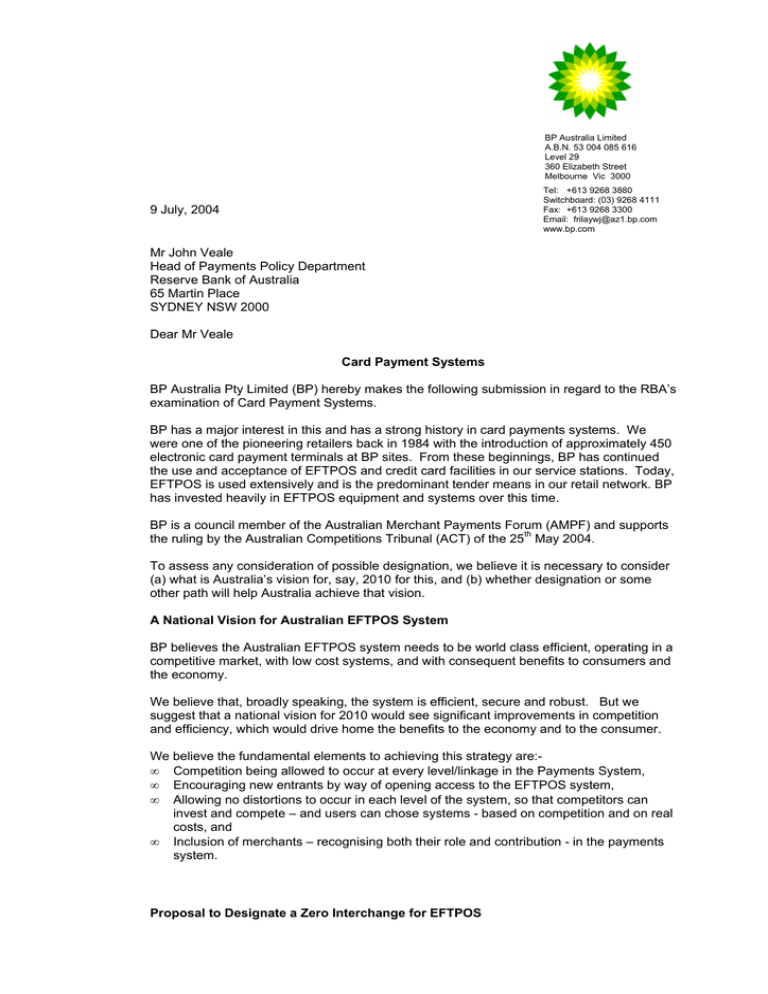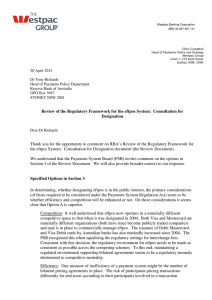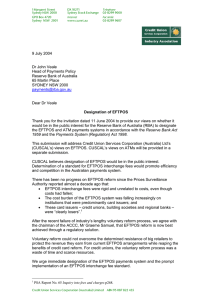Document 10818388
advertisement

BP Australia Limited A.B.N. 53 004 085 616 Level 29 360 Elizabeth Street Melbourne Vic 3000 Tel: +613 9268 3880 Switchboard: (03) 9268 4111 Fax: +613 9268 3300 Email: frilaywj@az1.bp.com www.bp.com 9 July, 2004 Mr John Veale Head of Payments Policy Department Reserve Bank of Australia 65 Martin Place SYDNEY NSW 2000 Dear Mr Veale Card Payment Systems BP Australia Pty Limited (BP) hereby makes the following submission in regard to the RBA’s examination of Card Payment Systems. BP has a major interest in this and has a strong history in card payments systems. We were one of the pioneering retailers back in 1984 with the introduction of approximately 450 electronic card payment terminals at BP sites. From these beginnings, BP has continued the use and acceptance of EFTPOS and credit card facilities in our service stations. Today, EFTPOS is used extensively and is the predominant tender means in our retail network. BP has invested heavily in EFTPOS equipment and systems over this time. BP is a council member of the Australian Merchant Payments Forum (AMPF) and supports the ruling by the Australian Competitions Tribunal (ACT) of the 25th May 2004. To assess any consideration of possible designation, we believe it is necessary to consider (a) what is Australia’s vision for, say, 2010 for this, and (b) whether designation or some other path will help Australia achieve that vision. A National Vision for Australian EFTPOS System BP believes the Australian EFTPOS system needs to be world class efficient, operating in a competitive market, with low cost systems, and with consequent benefits to consumers and the economy. We believe that, broadly speaking, the system is efficient, secure and robust. But we suggest that a national vision for 2010 would see significant improvements in competition and efficiency, which would drive home the benefits to the economy and to the consumer. We believe the fundamental elements to achieving this strategy are:• Competition being allowed to occur at every level/linkage in the Payments System, • Encouraging new entrants by way of opening access to the EFTPOS system, • Allowing no distortions to occur in each level of the system, so that competitors can invest and compete – and users can chose systems - based on competition and on real costs, and • Inclusion of merchants – recognising both their role and contribution - in the payments system. Proposal to Designate a Zero Interchange for EFTPOS BP strongly believes that designation of EFTPOS interchange would not serve Australia’s long-term interest as measured against these parameters. Artificially designating “zero interchange” for one link in the payments chain would:• • • • • Stifle competition, investment and new entrants in that link. No one would be prepared to invest or compete in that sector. The potential to drive efficiencies and lower charges would be greatly reduced Introduce a serious distortion into the system. Costs will not lie where they fall, with corresponding adjustments or recoveries, resulting in an economic loss both in the present and in the future In no way guarantee that any such savings would be passed on to the consumer. Designation per se does not achieve efficiency – it simply transfers costs elsewhere – somewhere in the chain it is most likely they will be recovered Produce inequities for those retailers such as BP who have made significant investments in EFTPOS, and which may not be remunerated because of designation Represent a sovereign risk and uncertainty for investors in EFTPOS as there would always be a major potential risk for arbitrary decisions by the authority which may render investments unviable. In the case of retailers such as BP who have invested heavily in secure EFTPOS and payment system infrastructure, we currently receive a rebate for each debit card transaction from our Acquirer in return for providing the use of our equipment network. This commercially negotiated rebate is effectively recognition for the capital investment and costs associated with the establishment, maintenance, on-going operation and upgrades of these systems. In the event of designation to zero interchange, several possible scenarios occur:• Acquiring banks may absorb the revenue losses from card issuers, or • The acquiring banks recover this loss from the merchant. The outcome of this is either:o the merchant’s investment in EFTPOS systems is rendered unviable and the merchant makes a loss, or o the merchant passes it on to the consumer. We believe none of these outcomes are desirable, and does not serve the long term strategy in any way. For the sake of any possible short term gain arising from designation, it simply creates major and long term problems to the sector. Recommendation BP strongly recommends that the RBA not designate EFTPOS interchange as it does not meet the Reserve Banks responsibility under the Reserve Bank Act 1959 – stated in the RBA media release dated 11 June 2004 - “to promote competition and efficiency in the Australian payments system”. Intervention by designation is likely to produce a misallocation of costs and/or benefits among the members (including merchants) of the payments system, impede competition and the market from working efficiently, and even provide windfall gains to some, without providing any benefits to the economy or the consumer. It increases the likelihood for future intervention, and therefore more uncertainty. BP supports the EFTPOS Access Working Group (EAWG) and agrees with the fundamental principle that, in order to encourage new entrants and thereby increase competition, there needs to be a more open access regime for the EFTPOS payment system. If the RBA were to take any action at all, we recommend this be limited to a monitoring role – with Treasury and the ACCC – of the costs and charges in Card Payment Systems. Yours faithfully Bill Frilay Manager, Government Relations

